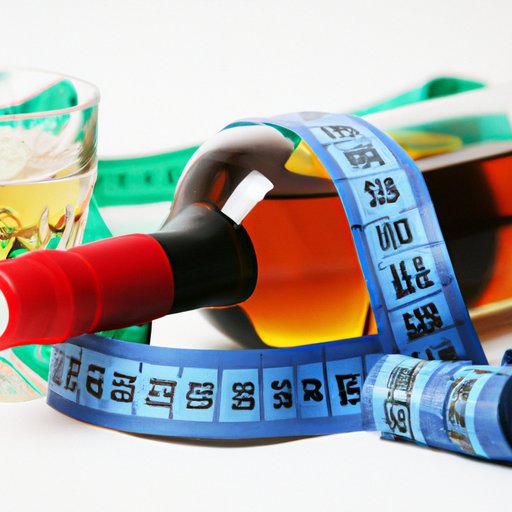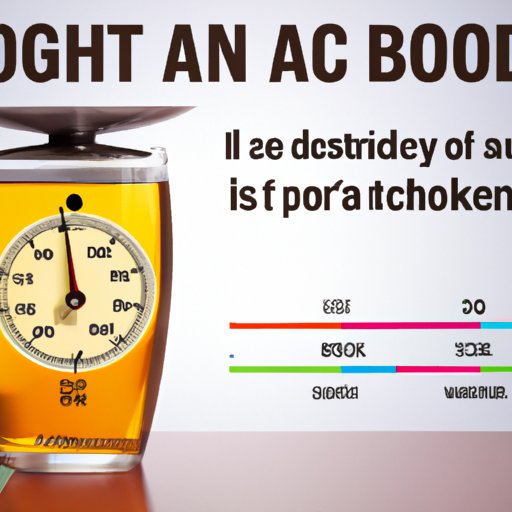
Introduction
Imagine this: it’s Friday night, you’re out with friends, and you decide to unwind with a glass of wine or a beer. While this is a common way to relax, have you ever wondered if drinking alcohol could be causing you to gain weight? In this article, we’ll explore the relationship between alcohol and weight gain, separating facts from fiction. We’ll discuss the science behind alcohol and how it affects weight gain, examine the link between alcohol and weight, and offer tips for enjoying alcohol while maintaining a healthy weight.
The Science behind Alcohol and Weight Gain: Separating Fact from Fiction
Understanding how your body processes alcohol is critical to assessing its impact on weight gain. When you consume an alcoholic drink, your liver must metabolize it. Unlike carbohydrates, fats, and proteins, alcohol has no nutritional value, which means that your body must use other sources of energy before beginning to break down alcohol. While this is happening, your body stops burning fat, which is why drinking alcohol can lead to weight gain.
The impact of alcohol on weight gain also varies depending on the type of drink being consumed. Alcoholic drinks are high in calories, especially beer, wine, and sugary cocktails, which we’ll discuss later. Clear spirits, such as vodka or gin, contain fewer calories per serving.
As for the myths surrounding alcohol and weight gain, let’s debunk a few.
One such myth is that beer alone causes beer bellies. Research has shown that drinking any form of alcohol can contribute to weight gain, though some forms contribute more than others.
Alcohol vs. Your Waistline: Exploring the Link between Drinking and Weight
Several studies have concluded that alcohol consumption is associated with weight gain. A meta-analysis of ten observational studies found a positive correlation between alcohol intake and abdominal obesity. Researchers reported that heavy drinkers are more likely to gain weight in the abdominal area, which is linked to a higher risk of cardiovascular disease, diabetes, and other health issues. The study also revealed that different types of alcohol affect weight gain differently, with beer being the most significant contributor.
One way alcohol contributes to abdominal obesity is through its effects on appetite. Drinking alcohol can increase food intake, leading to overeating and weight gain. Alcohol consumption can also affect metabolism and hormonal balance, both of which are critical to weight management. In addition, heavy drinking disrupts the balance of gut microbiota in the digestive tract, leading to weight gain.
Pouring Up the Pounds: How Alcohol Consumption Contributes to Weight Gain
Drinking alcohol contributes to weight gain in several ways other than just its calorie content. One way is by increasing calorie consumption. Drinking alcohol can cause you to eat more food than you usually would, which can cause you to consume more calories than your body needs.
Additionally, heavy drinking can lead to decreased physical activity and disrupted sleep, both of which contribute to weight gain. Your body burns fewer calories when you’re sedentary, and a lack of restful sleep can lead to overeating and decreased exercise.
Binge drinking and heavy drinking can also cause significant weight gain. Binge drinking is defined as consuming four or more drinks in one sitting for women and five or more drinks for men. Heavy drinking is classified as having eight or more drinks per week for women or fifteen or more drinks per week for men. Both are associated with an increased risk of obesity, particularly abdominal obesity.
Another factor that is often overlooked is the relationship between alcohol consumption and visceral fat. Visceral fat is a type of fat located deep inside the abdomen, surrounding vital organs such as the liver, pancreas, and intestines. Visceral fat accumulation has been linked to a higher risk of heart disease, insulin resistance, and other health issues. Research has shown that heavy drinking increases the amount of visceral fat stored in the body, increasing the risk of these health complications.

Weighing In on Booze: Understanding the Impact of Alcohol on Your Body Composition
Alcohol affects muscle mass and body composition in several ways. It can lead to a loss of muscle mass, which can have long-term negative effects on metabolism and overall health. Alcohol is also high in calories but has little nutritional value. As a result, it can make it harder to maintain or lose weight.
Additionally, consistent alcohol consumption has long-term effects on body composition. Research has shown that alcohol consumption is associated with an increased risk of insulin resistance, metabolic syndrome, and other health issues that can affect body composition.
The Blurred Lines between Alcohol and Obesity
The relationship between alcohol consumption and obesity is complex and multi-faceted. Obesity is prevalent among those who consume alcohol regularly compared to those who do not. It is also inversely related to socioeconomic status, further complicating the issue.
Heavy drinking has been linked to poorer diet quality and a higher body mass index (BMI) than non-drinkers. Similarly, people who consume alcohol tend to be less physically active than those who do not drink.
Combining alcohol and obesity carries potential risks, including a higher risk of inflammation, insulin resistance, and other health complications. However, it’s essential to note that moderate alcohol consumption does not appear to increase the risk of obesity or other health risks.
Your Skinny Cocktail Guide: Tips for Enjoying Alcohol While Maintaining a Healthy Weight
Despite the negative impact alcohol can have on weight management, there are ways to enjoy a drink without sabotaging your diet. Here are a few tips:
1. Choose spirits with low calorie or low sugar mixers: Clear spirits like vodka and gin have fewer calories than beer and wine. Choosing low-calorie or sugar-free mixers can help reduce calorie intake in cocktails.
2. Opt for light beer: if you prefer drinking beer, opt for light beer over regular beer. Light beer contains fewer calories and carbohydrates per serving.
3. Limit drinks to one or two: moderation is key. Limit the number of drinks you consume per night, and alternate between alcoholic and non-alcoholic beverages.
Straight Up or Mixed In? The Role of Mixers in Alcohol-Related Weight Gain
Mixers can significantly contribute to the calorie content of a drink. Sugary drinks like juice, soda, and tonic water can increase a drink’s total calorie content. One way to reduce calorie intake is to opt for sugar-free, low-calorie mixers, such as diet soda, sparkling water, or tonic water.
Another way to reduce calorie intake when drinking is to limit the number of mixers used in drinks. Choosing mixed drinks with only one or two mixers, or drinking straight liquor, can significantly reduce calorie intake.
Conclusion
The relationship between alcohol and weight gain is complex, but it’s essential to understand how alcohol affects your body before incorporating it into your diet. While alcohol can contribute to weight gain through its calorie content and impact on appetite, metabolism, and hormonal balance, it’s possible to enjoy a drink without sabotaging your diet. Moderation is key, and choosing low-calorie, low-sugar mixers can help reduce calorie intake. Remember that maintaining a healthy weight is essential to overall health and well-being.





